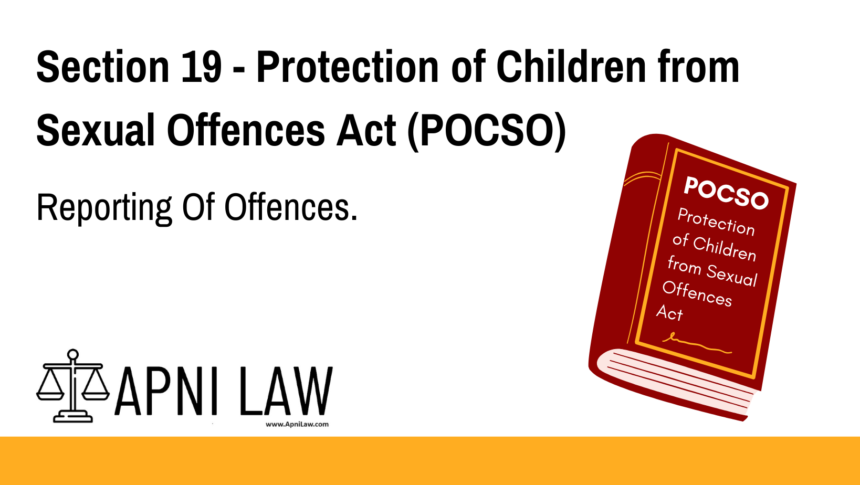Code: Section 19 POCSO Act
1) Notwithstanding anything contained in the Code of Criminal Procedure, 1973 (2 of1974)any person(including the child), who has apprehension that an offence under this Act is likely to be committed or has knowledge that such an offence has been committed, he shall provide such information to,—
(a) the Special Juvenile Police Unit; or
(b) the local police.
(2) Every report given under sub-section (1) shall be—
(a) ascribed an entry number and recorded in writing;
(b) be read over to the informant;
(c) shall be entered in a book to be kept by the Police Unit.
(3) Where the report under sub-section (1) is given by a child, the same shall be recorded under sub-section (2) in a simple language so that the child understands contents being recorded.
(4) In case contents are being recorded in the language not understood by the child or wherever it is deemed necessary, a translator or an interpreter, having such qualifications, experience and on payment of such fees as may be prescribed, shall be provided to the child if he fails to understand the same.
(5) Where the Special Juvenile Police Unit or local police is satisfied that the child against whom an offence has been committed is in need of care and protection, then, it shall, after recording the reasons in writing, make immediate arrangement to give him such care and protection including admitting the child into shelter home or to the nearest hospital within twenty-four hours of the report, as may be prescribed.
(6) The Special Juvenile Police Unit or local police shall, without unnecessary delay but within a period of twenty-four hours, report the matter to the Child Welfare Committee and the Special Court or where no Special Court has been designated, to the Court of Session, including need of the child for care and protection and steps taken in this regard.
(7) No person shall incur any liability, whether civil or criminal, for giving the information in good faith for the purpose of sub-section (1).
Explanation of Section 19 POCSO
Section 19 of the Protection of Children from Sexual Offences Act (POCSO) outlines the process and responsibilities for reporting offences under the Act. It emphasizes the duty of any person, including the child involved, to report potential or actual sexual offences against children to the relevant authorities.
This provision ensures that reports are recorded promptly and in a manner that the child can understand. It also mandates that the authorities take immediate steps to protect the child and address the offence, ensuring the child’s safety and well-being. Furthermore, the section protects individuals who report offences in good faith from legal liability.
Key Provisions
- Reporting Offences:
- Any person (including the child) aware of a likely or committed offence must report it to the Special Juvenile Police Unit or the local police.
- Recording the Report:
- The report must be documented, assigned an entry number, and read aloud to the informant.
- Special Considerations for Children:
- If the report is made by a child, it must be recorded in simple language that the child can understand.
- A translator or interpreter is required if the child cannot understand the language in which the report is made.
- Immediate Action for Care and Protection:
- If the police determine the child needs care, they must immediately arrange shelter, protection, or hospitalization within 24 hours.
- Reporting to Authorities:
- The police must report the matter to the Child Welfare Committee and the Special Court (or Court of Session) within 24 hours.
- Good Faith Immunity:
- Individuals reporting offences in good faith are not liable for civil or criminal consequences.
Illustration
Example 1: Reporting a Suspected Offence
A teacher suspects that one of her students is being abused and reports her concerns to the Special Juvenile Police Unit. The police record the report, assign an entry number, and read it back to her. Since the report was made in good faith, the teacher faces no legal repercussions.
Example 2: Reporting by a Child
A child who has witnessed an incident of abuse reports it to the local police. The police officer records the child’s statement in simple language that the child understands. If needed, an interpreter is provided to assist the child in understanding the contents of the report.
Example 3: Immediate Care and Protection
After receiving a report of sexual abuse, the police determine that the child is in urgent need of care and protection. The child is immediately taken to a shelter home within 24 hours to ensure their safety while the investigation continues.
Common Questions & Answers
1. Who can report offences under the POCSO Act?
Any person, including the child who is the victim or witness, is legally required to report any offence under the POCSO Act.
2. How should the report be recorded?
The report should be recorded in writing, assigned an entry number, and read aloud to the informant. If the report is made by a child, it must be recorded in simple language that the child understands.
3. What happens if the child does not understand the language in which the report is recorded?
If the child does not understand the language, a qualified translator or interpreter will be provided to assist in conveying the information.
4. Is there a time limit for the authorities to take action?
Yes, the Special Juvenile Police Unit or local police must report the matter to the Child Welfare Committee and the Special Court (or Court of Session) within 24 hours.
5. Are there any protections for those who report offences?
Yes, individuals who report offences in good faith are protected from any civil or criminal liability under the Act.
Conclusion
Section 19 of the POCSO Act ensures that offences involving children are promptly reported and recorded, while also safeguarding the child’s interests. It emphasizes the duty of individuals and authorities to act swiftly in protecting children and addressing any abuse. This section guarantees that those who report in good faith are protected from legal consequences, fostering a safer environment for children.
For more updates and legal insights on child protection, visit ApniLaw.








